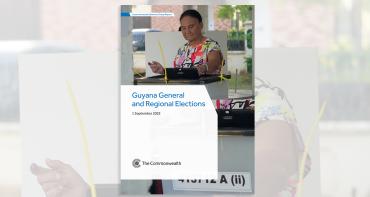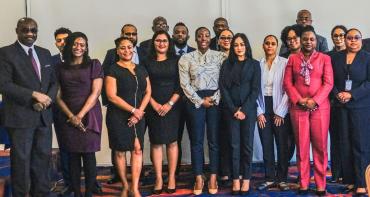The Commonwealth’s Special Adviser on Political Dialogue to Zambia has urged the country’s politicians and their followers to “stand united” and refrain from any acts or use of language which could incite electoral violence.

The Commonwealth’s Special Adviser on Political Dialogue to Zambia has urged the country’s politicians and their followers to “stand united” and refrain from any acts or use of language which could incite electoral violence.
Voters go to the polls today, 11 August 2016, in the sixth general elections to be held in Zambia since the introduction of multi-party democracy in 1991. The people are also being asked to vote in local elections and a national referendum on a Bill of Rights, with a team of Commonwealth observers in the country to observe the process.
Commonwealth Secretary-General Patricia Scotland appointed Professor Gambari as her Special Adviser to support the Electoral Commission of Zambia ahead of the country's elections, to enhance trust and promote a conducive and peaceful environment for the polls.
Speaking at a press conference on the eve of the elections, on 10 August at the headquarters of the Electoral Commission of Zambia in Lusaka, Professor Ibrahim Gambari said: “I entreat you all, especially political actors, not to go down in history as those responsible for casting Zambia’s nationhood into jeopardy.”
“Remember, violence is an uncontrollable monster: it is not a turnkey operation which can just be switched off after it is turned on. Do not let posterity, the world, national and international judicial instances and – above all – your people judge you as that person who has their blood on his or her hands.”
Professor Gambari, formerly Nigeria’s Minister of Foreign Affairs and a senior United Nations diplomat, has been consulting widely and working with the electoral commission and other stakeholders since his appointment. “My role, which is essentially preventive and peacebuilding in an electoral context, is different from that of election observers, though complementary to an extent,” he said.
During his press conference, the Special Adviser urged politicians to “commit to speaking to each other and not at each other” and to embrace mutual respect, graciousness and statesmanship, while avoiding vindictiveness in victory or defeat.
“National interest should prevail over any personal ambition pursuits. Remember that there shall surely be a Zambia after these elections. Political leadership is transient and the current political actors, both ruling party and opposition, will one day be gone. An important question is how they would want to be remembered.”
“I therefore encourage politicians and their followers to be responsible with the language they use against their opponents. Provocative, inciting and inflammatory messages are dangerous and detrimental to peace and eventual reconciliation. Let the people of Zambia be the true winners of these elections.”
The Special Adviser first visited Zambia on 10 July and he has returned three times since then, meeting with the President, various party leaders and presidential candidates, government officials, the Inspector General of Police, representatives of civil society organisations, media agencies, the first President of Zambia and other elder statesmen and senior officials.
Professor Gambari has also spoken at several public events organised by the electoral commission including the presentation of the findings of an independent audit on 13 July and the signing of a Peace Pledge on 15 July. He also attended the launch of the Election Results Centre on 9 August, as well as an electoral commission tour on 8 August to build the confidence of political party agents and help demystify the electoral process.
He has also met with members of the Commonwealth diplomatic community, European Union Ambassadors, the Ambassador of the United States, and the United Nations Resident Coordinator, among others.



